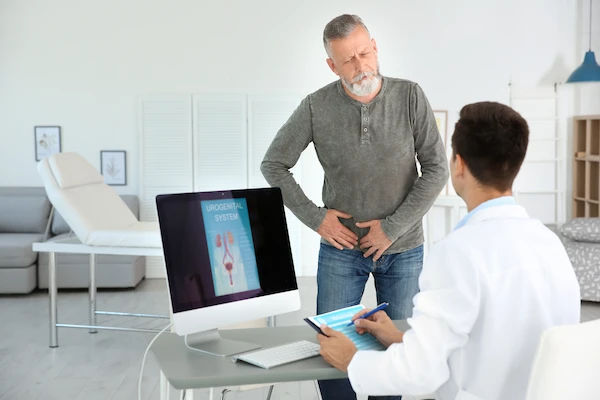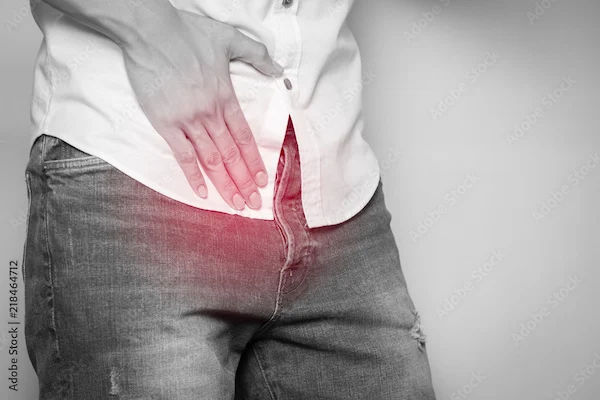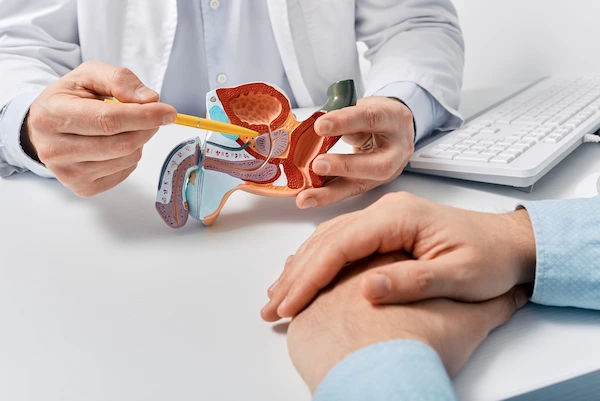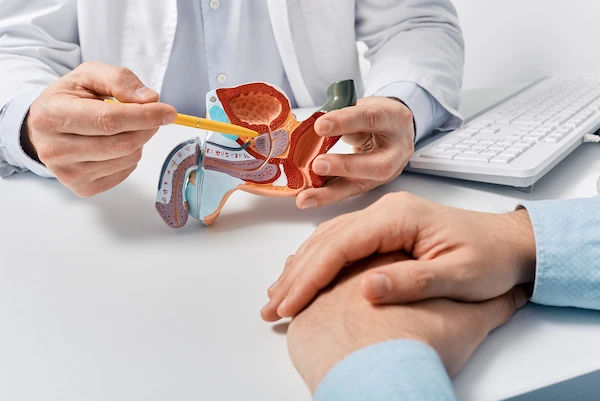Understanding Hormonal Therapy for Prostate Cancer
Learn how hormonal therapy (androgen deprivation therapy) helps manage prostate cancer. Understand treatment types, side effects, effectiveness, and how to manage them.

Written by Dr. Mohammed Kamran
Reviewed by Dr. Rohinipriyanka Pondugula MBBS
Last updated on 21st Aug, 2025

Prostate cancer is one of the most common cancers affecting men, especially as they age. If you or a loved one has been diagnosed with prostate cancer, you may have heard about hormonal therapy as a treatment option. This article will help you understand what hormonal therapy is, how it works, and what to expect during treatment.
What is Hormonal Therapy?
Hormonal therapy, also called androgen deprivation therapy (ADT), is a treatment that reduces or blocks male hormones (androgens) like testosterone, which can fuel prostate cancer growth. Since prostate cancer cells rely on these hormones to grow, lowering their levels can slow down or even shrink the tumour.
How Does Hormonal Therapy Work?
There are different types of hormonal therapy, including:
1. LHRH Agonists & Antagonists: These medications stop the testicles from producing testosterone. Examples include leuprolide (Lupron) and degarelix (Firmagon).
2. Anti-Androgens: These drugs block androgens from reaching cancer cells. Examples include bicalutamide (Casodex) and enzalutamide (Xtandi).
3. Orchiectomy (Surgical Castration): A surgical procedure to remove the testicles, which stops testosterone production permanently.
Your doctor will recommend the best option based on your cancer stage and overall health.
Who Needs Hormonal Therapy?
Hormonal therapy is often used in the following situations:
- Locally advanced prostate cancer (cancer that has spread outside the prostate but not to distant organs).
- Metastatic prostate cancer (cancer that has spread to other parts of the body).
- Before or after radiation therapy to improve effectiveness.
- For recurrent prostate cancer (if the cancer returns after initial treatment).
What Are the Side Effects?
Since hormonal therapy reduces testosterone levels, it can cause side effects similar to menopause in women. Common side effects include:
- Hot flashes
- Fatigue and low energy
- Loss of muscle mass and strength
- Weight gain
- Mood swings or depression
- Bone thinning (osteoporosis)
- Reduced sex drive and erectile dysfunction
While these side effects can be challenging, many can be managed with lifestyle changes, medications, or supportive therapies.
Consult Top Specialists
Tips for Managing Side Effects
- Stay Active: Regular exercise (walking, strength training) can help maintain muscle mass and improve mood.
- Eat a Balanced Diet: Focus on calcium-rich foods (milk, leafy greens) to support bone health.
- Stay Hydrated: Drink plenty of water to reduce fatigue.
- Talk to a Counsellor: Emotional support can help cope with mood changes.
- Discuss Medications: Your doctor may prescribe supplements or other treatments to ease side effects.
How Effective is Hormonal Therapy?
Hormonal therapy can be very effective in controlling prostate cancer, especially when combined with other treatments like radiation or chemotherapy. However, over time, some cancers may become resistant to hormonal therapy, requiring alternative treatments.
When to Seek Help?
If you experience severe side effects or new symptoms (like bone pain or urinary problems), consult your doctor immediately.
Can Hormonal Therapy Cure Prostate Cancer?
Hormonal therapy is not a cure, but it can help control cancer growth and improve quality of life. In some cases, it may be used alongside other treatments for better outcomes.
Next Steps
If you or a loved one has been diagnosed with prostate cancer, discussing hormonal therapy with a specialist is crucial. Apollo 24|7 offers expert consultations and diagnostic services to guide you through the best treatment options.
Book a Consultation Today!
You can easily schedule an appointment with an oncologist through Apollo 24|7 for personalised care and support.
Final Thoughts
Prostate cancer treatment has come a long way, and hormonal therapy remains a key option for many patients. While side effects can be challenging, proper management and support can help maintain a good quality of life. Stay informed, follow your doctor’s advice, and don’t hesitate to seek help when needed.
Remember: Early detection and timely treatment make a big difference. Stay proactive about your health!
Would you like to know more about prostate cancer treatments? Visit Apollo 24|7 for trusted medical advice and care.
Consult Top Specialists
Consult Top Specialists

Dr. Anand Ravi
General Physician
2 Years • MBBS
Bengaluru
PRESTIGE SHANTHINIKETAN - SOCIETY CLINIC, Bengaluru

Dr. Gunashree V L
General Physician/ Internal Medicine Specialist
3 Years • MBBS
Bengaluru
Apollo Clinic, JP nagar, Bengaluru

Dr Syed Mateen Pasha
General Physician
2 Years • MBBS
Bengaluru
PRESTIGE SHANTHINIKETAN - SOCIETY CLINIC, Bengaluru

Dr Suseela
General Physician
5 Years • MBBS
Bengaluru
Apollo Medical Center, Marathahalli, Bengaluru

Dr. Avinash Pasuparthy
General Practitioner
5 Years • MBBS
Visakhapatnam
Apollo Clinic Vizag, Visakhapatnam
Consult Top Specialists

Dr. Anand Ravi
General Physician
2 Years • MBBS
Bengaluru
PRESTIGE SHANTHINIKETAN - SOCIETY CLINIC, Bengaluru

Dr. Gunashree V L
General Physician/ Internal Medicine Specialist
3 Years • MBBS
Bengaluru
Apollo Clinic, JP nagar, Bengaluru

Dr Syed Mateen Pasha
General Physician
2 Years • MBBS
Bengaluru
PRESTIGE SHANTHINIKETAN - SOCIETY CLINIC, Bengaluru

Dr Suseela
General Physician
5 Years • MBBS
Bengaluru
Apollo Medical Center, Marathahalli, Bengaluru

Dr. Avinash Pasuparthy
General Practitioner
5 Years • MBBS
Visakhapatnam
Apollo Clinic Vizag, Visakhapatnam




